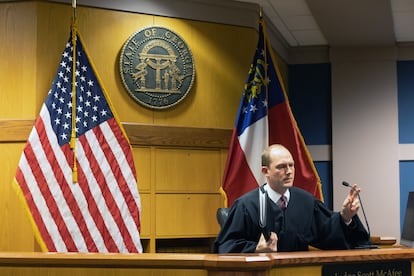The judge in Trump’s Georgia election case limits the disclosure of evidence after videos’ release
News outlets this week reported on the contents of and published clips from interviews that four defendants conducted with prosecutors as part of their plea deals

The judge overseeing the election interference case against former President Donald Trump and others in Georgia issued an order on Thursday that prohibits the release of certain evidence. The ruling came after news outlets this week reported on the contents of and published clips from interviews that four defendants conducted with prosecutors as part of their plea deals.
Fulton County Superior Court Judge Scott McAfee wrote that allowing parties the “unfettered ability” to publicly share pretrial materials undermines the discovery process, during which lawyers for both sides share evidence. “Potential jurors should be limited from exposure to materials that may be deemed inadmissible at trial,” McAfee wrote.
“The likelihood of harm in this case is severe, as extensive media coverage guarantees broad dissemination of any disclosed discovery materials,” McAfee wrote.
Fulton County District Attorney Fani Willis had initially asked for an order prohibiting the disclosure of any of the evidence shared with the defense. But prosecutors told the judge during a remote hearing Wednesday they agreed with a more narrowly focused order proposed by one of the defendants.
A lawyer for a coalition of news outlets, including The Associated Press, argued during the hearing against any protective order, saying such a step requires the showing of a substantial threat of physical or economic harm to a witness — and that this burden had not been met.
McAfee also set a hearing for Tuesday on Willis’ request to revoke the bond of defendant Harrison Floyd and the judge said Floyd is required to attend. Willis says Floyd has been trying to intimidate and communicate with witnesses and others defendants, in violation of the conditions of his bond agreement. His lawyer, Chris Kachouroff, told The Associated Press on Wednesday that Willis’ motion is without merit.
Trump and 18 other people were charged in August with participating in a wide-ranging scheme to illegally try to keep the then-Republican president in power after his 2020 loss to Democrat Joe Biden. Four people have pleaded guilty after reaching deals with prosecutors. The remaining 15 have pleaded not guilty. No trial date has been set.
McAfee’s order instructs prosecutors to review their discovery and designate as “sensitive materials” anything they believe should not be disclosed. Defendants will have 14 days after receiving the discovery to contest that designation. If the two sides cannot agree on whether it is appropriate, the judge will decide. The evidence would not be disclosed until he has ruled.
The protective order does not apply to information or records that are publicly available, that the defendants obtain in another way or that has been field or received as evidence in another court proceeding.
Defense attorney Jonathan Miller, who represents former Coffee County elections director Misty Hampton, told the judge he had released the videos of the interviews to one media outlet, but did not identify it. The Washington Post and ABC News reported on the videos Monday.
The interviews, called proffers, gave a glimpse into what kind of testimony might be offered at trial by the four people who pleaded guilty: lawyers Sidney Powell, Kenneth Chesebro and Jenna Ellis, and bail bondsman and Trump supporter Scott Hall.
Miller said he believes that the interviews with two of those people — Powell and Hall — could be helpful to his client and argued that the public had the right to see what they said.
Sign up for our weekly newsletter to get more English-language news coverage from EL PAÍS USA Edition
Tu suscripción se está usando en otro dispositivo
¿Quieres añadir otro usuario a tu suscripción?
Si continúas leyendo en este dispositivo, no se podrá leer en el otro.
FlechaTu suscripción se está usando en otro dispositivo y solo puedes acceder a EL PAÍS desde un dispositivo a la vez.
Si quieres compartir tu cuenta, cambia tu suscripción a la modalidad Premium, así podrás añadir otro usuario. Cada uno accederá con su propia cuenta de email, lo que os permitirá personalizar vuestra experiencia en EL PAÍS.
¿Tienes una suscripción de empresa? Accede aquí para contratar más cuentas.
En el caso de no saber quién está usando tu cuenta, te recomendamos cambiar tu contraseña aquí.
Si decides continuar compartiendo tu cuenta, este mensaje se mostrará en tu dispositivo y en el de la otra persona que está usando tu cuenta de forma indefinida, afectando a tu experiencia de lectura. Puedes consultar aquí los términos y condiciones de la suscripción digital.








































